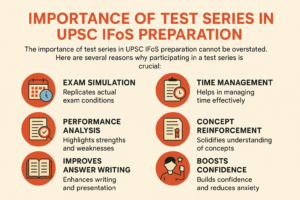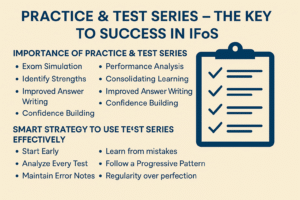The UPSC Civil Services Mains Examination is not just about knowledge; it is about how well you present that knowledge within limited time and word count. Every year, thousands of aspirants fail to score high in Mains despite having good content knowledge, primarily due to poor answer writing skills.
Mastering the art of answer writing is the key to success in UPSC Mains. Let’s explore the best strategies, techniques, and tips to improve your marks.
Why Answer Writing Matters in UPSC Mains
Evaluator-Centric Exam – Answers must be clear, structured, and easy to evaluate.
Time-Constrained Test – 3 hours for 20 questions demands precision and speed.
Marks Booster – Well-structured answers can improve marks even if content is average.
Reflection of Personality – Analytical, balanced, and to-the-point answers reflect maturity.
Essential Answer Writing Tips for UPSC Mains
1. Understand the Question First
Pay attention to directive words like Discuss, Analyze, Critically Evaluate, Comment, Examine.
Break down the question into parts before starting.
Example:
“Critically analyze the impact of globalization on Indian agriculture.”
Part 1: Globalization’s impact (positive + negative).
Part 2: Critical analysis (balanced view with conclusion).
2. Follow a Structured Format (Intro – Body – Conclusion)
Introduction (20-30 words): Define key terms, give a fact, or start with a relevant example.
Body (Main part): Use subheadings, bullet points, and flowcharts. Cover multiple dimensions – political, economic, social, environmental.
Conclusion (20-30 words): Provide a balanced view, suggest a way forward, or quote a committee/report.
Pro Tip: Use the “Demand of the Question” (DoQ) approach – answer exactly what is asked.
3. Use Diagrams, Flowcharts, and Maps
Diagrams save time and convey more in fewer words.
Maps are highly effective in Geography, Environment, and International Relations answers.
Flowcharts help in Economy, Polity, and Ethics.
4. Write in Simple, Clear Language
Avoid jargon and long sentences.
Stick to keywords and phrases important for UPSC.
Use short paragraphs or points for readability.
5. Link Static with Current Affairs
Quoting recent judgments, schemes, reports, and international developments shows awareness.
Example: While answering a Polity question, mention a recent Supreme Court verdict.
6. Time Management in Mains Answer Writing
Aim for 7 minutes per question in GS papers.
Don’t overspend on one question; maximize attempts.
Practice writing 20 questions in 3 hours before the exam.
7. Include Facts, Reports, and Data
Use NITI Aayog reports, Economic Survey, NCRB data, UNDP Index, World Bank reports.
Facts add authenticity and improve marks.
8. Develop a Balanced Approach
Always present both sides of an argument.
Avoid extreme views; UPSC expects balanced, constructive analysis.
9. Practice Answer Writing Regularly
Join a test series to simulate exam conditions.
Write answers daily from newspapers and previous year’s questions.
Get answers evaluated for feedback.
10. Improve Presentation Skills
Highlight keywords.
Use underlining (not excessive).
Leave proper spacing between points.
Common Mistakes to Avoid
Writing too much introduction, leaving less space for analysis.
Ignoring directive words and writing off-topic.
Not finishing the paper due to poor time management.
Using decorative language instead of clarity.
Lack of revision leading to factual errors.
Bonus: Sample Answer Structure
Q: Discuss the significance of the 73rd Constitutional Amendment in strengthening democracy at the grassroots level.
Intro: Mention the year (1992), 73rd Amendment, Panchayati Raj introduction.
Body:
Political empowerment (women’s reservation, local governance).
Economic impact (fund devolution).
Social inclusiveness.
Challenges (funds, capacity, corruption).
Conclusion: Suggest reforms + quote Gandhi’s vision of “Gram Swaraj.”
FAQs on UPSC Mains Answer Writing
1. How many words should I write in UPSC Mains answers?
Most answers are between 150–250 words depending on the question. Stick to the word limit.
2. Should I write answers in paragraphs or points?
Use a hybrid style – short paragraphs + bullet points for clarity.
3. How to handle questions where I don’t know much?
Write basic definition, general impacts, and a balanced conclusion. Attempt all questions.
4. How can I improve speed in answer writing?
Practice writing previous year’s papers within time limits and use flowcharts/diagrams.
5. Are diagrams necessary in every answer?
Not mandatory, but whenever possible, add them. They fetch extra marks.
6. How to make answers stand out?
Use facts, data, examples, case studies.
Present multi-dimensional analysis.
End with positive way forward.
7. How much practice is enough for Mains answer writing?
Daily practice of 2-3 answers and weekly full-length tests is ideal.
✅ Mastering answer writing is the bridge between knowledge and marks in UPSC Mains. With structured preparation, practice, and smart presentation, you can significantly boost your Mains score and move closer to your IAS dream.










